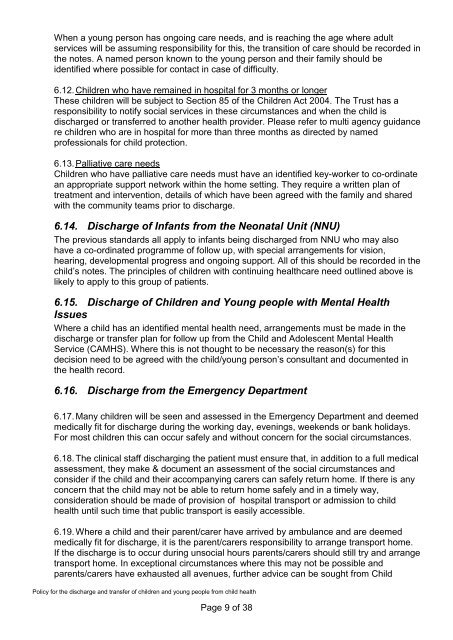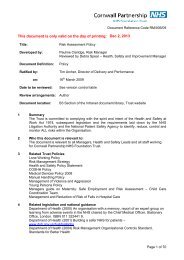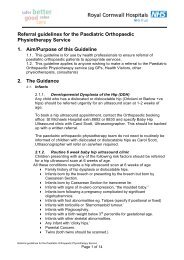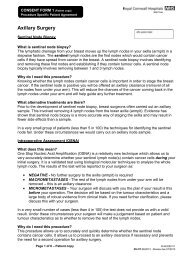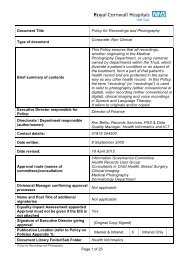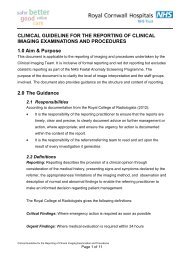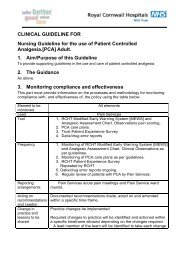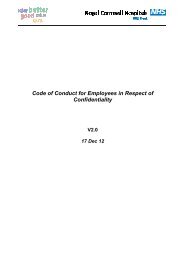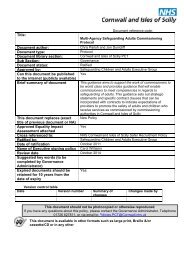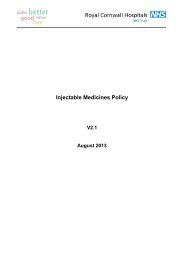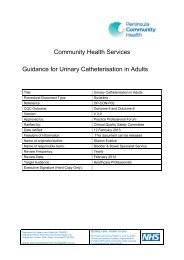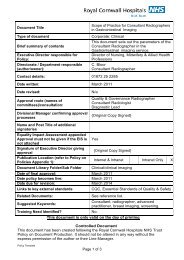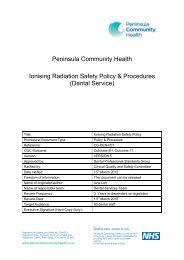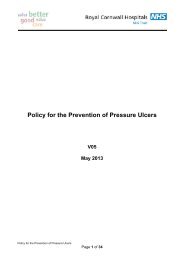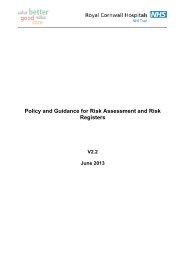Policy for the Discharge and transfer of children and young people ...
Policy for the Discharge and transfer of children and young people ...
Policy for the Discharge and transfer of children and young people ...
You also want an ePaper? Increase the reach of your titles
YUMPU automatically turns print PDFs into web optimized ePapers that Google loves.
When a <strong>young</strong> person has ongoing care needs, <strong>and</strong> is reaching <strong>the</strong> age where adultservices will be assuming responsibility <strong>for</strong> this, <strong>the</strong> transition <strong>of</strong> care should be recorded in<strong>the</strong> notes. A named person known to <strong>the</strong> <strong>young</strong> person <strong>and</strong> <strong>the</strong>ir family should beidentified where possible <strong>for</strong> contact in case <strong>of</strong> difficulty.6.12. Children who have remained in hospital <strong>for</strong> 3 months or longerThese <strong>children</strong> will be subject to Section 85 <strong>of</strong> <strong>the</strong> Children Act 2004. The Trust has aresponsibility to notify social services in <strong>the</strong>se circumstances <strong>and</strong> when <strong>the</strong> child isdischarged or <strong>transfer</strong>red to ano<strong>the</strong>r health provider. Please refer to multi agency guidancere <strong>children</strong> who are in hospital <strong>for</strong> more than three months as directed by namedpr<strong>of</strong>essionals <strong>for</strong> child protection.6.13. Palliative care needsChildren who have palliative care needs must have an identified key-worker to co-ordinatean appropriate support network within <strong>the</strong> home setting. They require a written plan <strong>of</strong>treatment <strong>and</strong> intervention, details <strong>of</strong> which have been agreed with <strong>the</strong> family <strong>and</strong> sharedwith <strong>the</strong> community teams prior to discharge.6.14. <strong>Discharge</strong> <strong>of</strong> Infants from <strong>the</strong> Neonatal Unit (NNU)The previous st<strong>and</strong>ards all apply to infants being discharged from NNU who may alsohave a co-ordinated programme <strong>of</strong> follow up, with special arrangements <strong>for</strong> vision,hearing, developmental progress <strong>and</strong> ongoing support. All <strong>of</strong> this should be recorded in <strong>the</strong>child’s notes. The principles <strong>of</strong> <strong>children</strong> with continuing healthcare need outlined above islikely to apply to this group <strong>of</strong> patients.6.15. <strong>Discharge</strong> <strong>of</strong> Children <strong>and</strong> Young <strong>people</strong> with Mental HealthIssuesWhere a child has an identified mental health need, arrangements must be made in <strong>the</strong>discharge or <strong>transfer</strong> plan <strong>for</strong> follow up from <strong>the</strong> Child <strong>and</strong> Adolescent Mental HealthService (CAMHS). Where this is not thought to be necessary <strong>the</strong> reason(s) <strong>for</strong> thisdecision need to be agreed with <strong>the</strong> child/<strong>young</strong> person’s consultant <strong>and</strong> documented in<strong>the</strong> health record.6.16. <strong>Discharge</strong> from <strong>the</strong> Emergency Department6.17. Many <strong>children</strong> will be seen <strong>and</strong> assessed in <strong>the</strong> Emergency Department <strong>and</strong> deemedmedically fit <strong>for</strong> discharge during <strong>the</strong> working day, evenings, weekends or bank holidays.For most <strong>children</strong> this can occur safely <strong>and</strong> without concern <strong>for</strong> <strong>the</strong> social circumstances.6.18. The clinical staff discharging <strong>the</strong> patient must ensure that, in addition to a full medicalassessment, <strong>the</strong>y make & document an assessment <strong>of</strong> <strong>the</strong> social circumstances <strong>and</strong>consider if <strong>the</strong> child <strong>and</strong> <strong>the</strong>ir accompanying carers can safely return home. If <strong>the</strong>re is anyconcern that <strong>the</strong> child may not be able to return home safely <strong>and</strong> in a timely way,consideration should be made <strong>of</strong> provision <strong>of</strong> hospital transport or admission to childhealth until such time that public transport is easily accessible.6.19. Where a child <strong>and</strong> <strong>the</strong>ir parent/carer have arrived by ambulance <strong>and</strong> are deemedmedically fit <strong>for</strong> discharge, it is <strong>the</strong> parent/carers responsibility to arrange transport home.If <strong>the</strong> discharge is to occur during unsocial hours parents/carers should still try <strong>and</strong> arrangetransport home. In exceptional circumstances where this may not be possible <strong>and</strong>parents/carers have exhausted all avenues, fur<strong>the</strong>r advice can be sought from Child<strong>Policy</strong> <strong>for</strong> <strong>the</strong> discharge <strong>and</strong> <strong>transfer</strong> <strong>of</strong> <strong>children</strong> <strong>and</strong> <strong>young</strong> <strong>people</strong> from child healthPage 9 <strong>of</strong> 38


